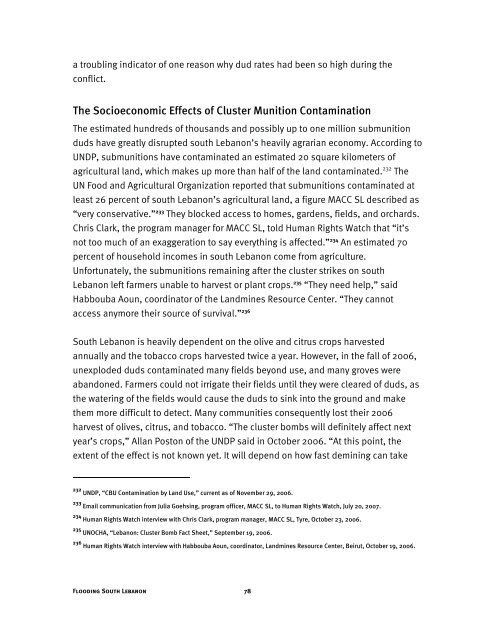Flooding South Lebanon - Human Rights Watch
Flooding South Lebanon - Human Rights Watch
Flooding South Lebanon - Human Rights Watch
You also want an ePaper? Increase the reach of your titles
YUMPU automatically turns print PDFs into web optimized ePapers that Google loves.
a troubling indicator of one reason why dud rates had been so high during the<br />
conflict.<br />
The Socioeconomic Effects of Cluster Munition Contamination<br />
The estimated hundreds of thousands and possibly up to one million submunition<br />
duds have greatly disrupted south <strong>Lebanon</strong>’s heavily agrarian economy. According to<br />
UNDP, submunitions have contaminated an estimated 20 square kilometers of<br />
agricultural land, which makes up more than half of the land contaminated. 232 The<br />
UN Food and Agricultural Organization reported that submunitions contaminated at<br />
least 26 percent of south <strong>Lebanon</strong>’s agricultural land, a figure MACC SL described as<br />
“very conservative.” 233 They blocked access to homes, gardens, fields, and orchards.<br />
Chris Clark, the program manager for MACC SL, told <strong>Human</strong> <strong>Rights</strong> <strong>Watch</strong> that “it’s<br />
not too much of an exaggeration to say everything is affected.” 234 An estimated 70<br />
percent of household incomes in south <strong>Lebanon</strong> come from agriculture.<br />
Unfortunately, the submunitions remaining after the cluster strikes on south<br />
<strong>Lebanon</strong> left farmers unable to harvest or plant crops. 235 “They need help,” said<br />
Habbouba Aoun, coordinator of the Landmines Resource Center. “They cannot<br />
access anymore their source of survival.” 236<br />
<strong>South</strong> <strong>Lebanon</strong> is heavily dependent on the olive and citrus crops harvested<br />
annually and the tobacco crops harvested twice a year. However, in the fall of 2006,<br />
unexploded duds contaminated many fields beyond use, and many groves were<br />
abandoned. Farmers could not irrigate their fields until they were cleared of duds, as<br />
the watering of the fields would cause the duds to sink into the ground and make<br />
them more difficult to detect. Many communities consequently lost their 2006<br />
harvest of olives, citrus, and tobacco. “The cluster bombs will definitely affect next<br />
year’s crops,” Allan Poston of the UNDP said in October 2006. “At this point, the<br />
extent of the effect is not known yet. It will depend on how fast demining can take<br />
232 UNDP, “CBU Contamination by Land Use,” current as of November 29, 2006.<br />
233 Email communication from Julia Goehsing, program officer, MACC SL, to <strong>Human</strong> <strong>Rights</strong> <strong>Watch</strong>, July 20, 2007.<br />
234 <strong>Human</strong> <strong>Rights</strong> <strong>Watch</strong> interview with Chris Clark, program manager, MACC SL, Tyre, October 23, 2006.<br />
235 UNOCHA, “<strong>Lebanon</strong>: Cluster Bomb Fact Sheet,” September 19, 2006.<br />
236 <strong>Human</strong> <strong>Rights</strong> <strong>Watch</strong> interview with Habbouba Aoun, coordinator, Landmines Resource Center, Beirut, October 19, 2006.<br />
<strong>Flooding</strong> <strong>South</strong> <strong>Lebanon</strong> 78
















